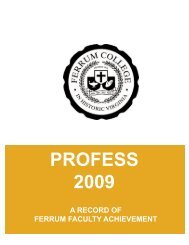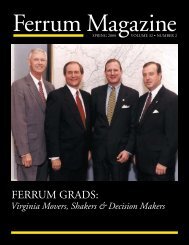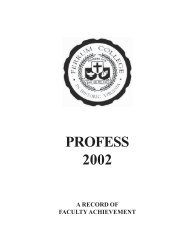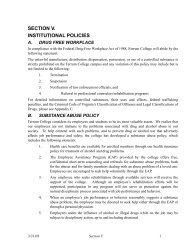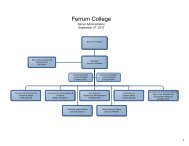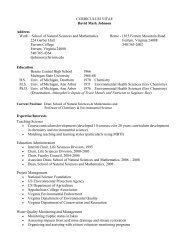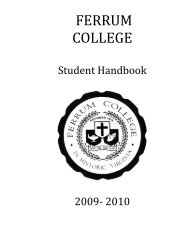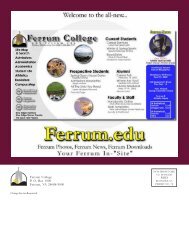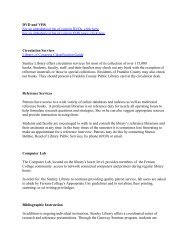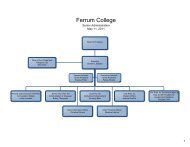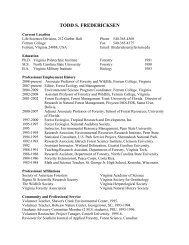Jerry and Shirley Boone: - Ferrum College
Jerry and Shirley Boone: - Ferrum College
Jerry and Shirley Boone: - Ferrum College
You also want an ePaper? Increase the reach of your titles
YUMPU automatically turns print PDFs into web optimized ePapers that Google loves.
IN THE Dr. CLASSROOM:<br />
Cy Dillon, III<br />
Library Director<br />
By Lisa J. Bowling<br />
The disharmony of laughter <strong>and</strong> verbal sparring. The computer bank<br />
keyboards’ clatter. The crossfire of newcomer greetings. The musty<br />
sounds of a mausoleum relegated to yesteryear. With his door<br />
customarily wide open, Dr. Cy Dillon, III, library director <strong>and</strong><br />
Academic Support division chair, revels in the controlled chaos of The<br />
Paper Chase archetype run amok.<br />
Head of Public Services George Lovel<strong>and</strong> equates it to “an open<br />
marketplace of ideas. The academic equivalent of the barbershop. It is<br />
a place where you can try out new ideas.”<br />
The twirl of voices, dancing through intellectual exchange, belies a<br />
1985 administrative m<strong>and</strong>ate to Dillon to quiet the setting for a more<br />
scholarly–read staid–atmosphere. The 60 computers now spanning<br />
cyberspace give no hint of a time when there was only one Apple IIE<br />
at his–<strong>and</strong> the campus’s–disposal. In those days, book checkout <strong>and</strong><br />
usage statistics were done manually. Fees were still levied as late fines.<br />
And Dillon, as the new director, sans a library degree, was determined<br />
to learn on the job.<br />
After a four-year stint as <strong>Ferrum</strong>’s Associate Dean, charged with<br />
leading the school’s conversion to a baccalaureate–conferring school,<br />
Dillon met his new role with skepticism <strong>and</strong> thoughts of returning to<br />
his previous work in public education. Within months, however, his<br />
enthusiasm grew to voluminous proportions. It was an early lesson,<br />
one he hasn’t forgotten: Sometimes the work one gets is better than<br />
the role one picks.<br />
Lovel<strong>and</strong> maintains Dillon’s lack of formal library training allows<br />
him to see opportunities where others see impossibilities. “He never<br />
gets bogged down in what we can’t do. He formulates ideas as a user,<br />
scholar <strong>and</strong> a teacher.” Dillon explains, “I learn a lot about how to<br />
make a library work by listening to the students.”<br />
The challenges of being a library director today are complex.<br />
Dillon finds that one of his major roles is to identify emerging<br />
applications for learning. He has witnessed the move from bound<br />
works into e-books, <strong>and</strong> from massive main frames to wireless<br />
hardware <strong>and</strong> portable personal digital assistants (PDAs). “We now<br />
have to work not only in our physical library space, but also in<br />
cyberspace, where there’s so much information.”<br />
“Things are becoming more condensed, more a matter of navigating<br />
cyberspace than of controlling space.” Subject matter will become more<br />
accessible, less cumbersome <strong>and</strong> easier to use. “But our job will still be<br />
to help students underst<strong>and</strong> how to find <strong>and</strong> use that information.”<br />
“Cy foremost is a teacher,” Lovel<strong>and</strong> offers. “He is an effective<br />
administrator, but when he faces a situation in which the administrative<br />
duties compete with the needs of students, the students get the<br />
attention. He always remembers what we are really here for.”<br />
Dillon values this role. “The great thing about a job like this is that<br />
we work with students. We’re not exalted in a sense of lecturing from<br />
a platform. We’re not administrators who make rules. We’re someone<br />
who will teach a class, but we’ll also sit down <strong>and</strong> help the students<br />
work through problems.”<br />
“Our goal is to know [students’] names, greet them, find out what<br />
they need <strong>and</strong> help them find it.” He is especially proud that “they trust<br />
us to help them when we can <strong>and</strong> to find someone for them when we<br />
can’t. Even small colleges usually don’t give that level of attention.”<br />
“While others on campus are debating decisions, he has always stayed<br />
focused on the needs of students,” says Lovel<strong>and</strong>. “High speed printers,<br />
new chairs, new books <strong>and</strong> databases, free microfilm copies: all were<br />
student suggestions that Cy responded to...I think that the changes he<br />
has made are driven...by staying in tune with students’ needs.”<br />
“Learn what the history is, but don’t become a slave to it,”<br />
Dillon elaborates, “There is little sadder than those intimidated<br />
by technology, who present themselves as purists. Quill pens<br />
aren’t generally the writing tool of choice. Now, neither is a ball point<br />
pen or manual typewriter...A good craftsperson can adjust to the<br />
changing technologies.”<br />
“It’s really exciting to know that our students, in a rural setting,<br />
peaceful surrounding ...still have the information resources they<br />
would have at a Columbia or a University of Virginia. It’s one of the<br />
great things about technology: it lets us feel really first rate, not just<br />
in the service we provide, but in the resources we can use.”<br />
Dillon must be credited for many of those resources, initiating <strong>and</strong><br />
fostering higher education cooperative ventures that have benefited<br />
thous<strong>and</strong>s of students. In his first years at Stanley Library, he worked<br />
with Virginia Intermont <strong>and</strong> Emory <strong>and</strong> Henry <strong>College</strong>s to form<br />
SWING or Southwest Information Network Group, as a means to<br />
reduce his purchase costs <strong>and</strong> increase his holdings. SWING is now<br />
one of the largest, multitype library buying consortiums in the United<br />
States, with more than 100 member library systems.<br />
Working through the Virginia Independent <strong>College</strong> <strong>and</strong> University<br />
Library Association (VICULA), he brokered a partnership with 16<br />
private colleges around Virginia, allowing each of them access to<br />
more than 6,000 newspapers, magazines <strong>and</strong> business reports through<br />
the Dow Jones service for only $2,000 annually. Another recent<br />
example, an Appalachian <strong>College</strong> Association Mellon Grant provided<br />
a phenomenal resource return for member libraries. Investing<br />
only $12,000, <strong>Ferrum</strong> should reap over $100,000 worth of volumes<br />
<strong>and</strong> journals.<br />
Although Dillon claims, “I enjoy the leadership role, but I hate to<br />
be the center of attention,” he has acted as a professional pacesetter.<br />
From 1997-1999, he served as the first elected president of VICULA.<br />
He is immediate past president of the Virginia Library Association,<br />
where he represented 1,200 members. He also serves as a library<br />
advocate, lobbying legislators on issues ranging from privacy to<br />
freedom of information concerns.<br />
“For a non-librarian, he’s one of the best librarians I’ve ever<br />
encountered, with an incredible commitment to helping those of us<br />
in the profession,” declares Nan Seamans, director of instruction for<br />
Virginia Tech’s University Libraries. “He’s well-known to many<br />
around the state <strong>and</strong> the region as a knowledgeable <strong>and</strong> caring<br />
librarian, as well as a good friend.”<br />
Dillon muses, “I think about this a lot...I don’t think I could have<br />
developed a sense of contributing to an institution in quite the same<br />
way anywhere else, because here I’m not locked into doing one thing.<br />
I’ve been able to participate in so much.”<br />
“<strong>Ferrum</strong> gave me a chance to discover my real potential, the same<br />
way it does for students like my son, Jim. Here it is, if you can do it.<br />
What an exciting situation to be in! Usually you don’t get that kind<br />
of chance to grow. I have really loved being here for the last 20 years.<br />
...This is the perfect environment.”<br />
FERRUM MAGAZINE 11



